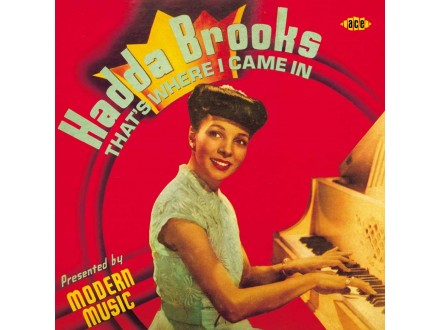Hadda Brooks - That`s Where I Came In NOVO
| Cena: |
| Stanje: | Nekorišćen |
| Garancija: | Ne |
| Isporuka: | Pošta Post Express Lično preuzimanje |
| Plaćanje: | Ostalo (pre slanja) Lično |
| Grad: |
Novi Sad, Novi Sad |
Izdavač: Ostalo
Žanr: Bluz, Džez, Fank i Soul, R&B
Poreklo: Strani izvođač
NOVO, U CELOFANU
ORIGINAL STRANO IZDANJE
The Modern Recordings 1946-47
I cottoned on to Hadda Brooks fairly early or so I thought. In 1950 I purchased I Hadn`t Anyone But You, on London Records, her first UK release. Sometime later I witnessed her performing that selfsame Ray Noble song in the Bogart film In A Lonely Place. Then, one night at the Wembley Pool, during a Harlem Globetrotters basketball game, somebody wheeled a piano out into the middle of the auditorium. A loudspeaker blurted that, during the interval, we`d be entertained by Miss Hadda Brooks! And for fifteen glorious minutes Hadda sang and played superbly, in intimate style, while the audience generally indulged in grabbing crisps and ice-creams or merely heading for the nearest loo, totally ignoring Hadda doing it Steinway and leaving me mentally screaming.
In truth, Hadda had achieved much before I`d ever heard of her. It was back in 1945 when jukebox operator Jules Bihari first took a personal shine to both her looks and her talent and formed Modern as a record label on which to display Hadda`s abundant talent as a boogie pianist. Dubbed Queen Of The Boogie, Hadda began knocking out eight-to-a-bar instrumental singles with alacrity, accruing the kind of sales that allowed Bihari to eventually sign such artists as B.B. King, Etta James, Johnny Moore`s Three Blazers, Elmore James and others.
The possessor of a sultry, seductive vocal delivery, the woman born Hadda Hopwood moved on from boogie heaven at the close of 1946, when, with a modicum of prompting from bandleader Charlie Barnet, she emerged as a singer of songs for the early hour, a classy, supper-club diva. Her vocal debut for Modern, You Won`t Let Me Go, proved a steady seller but it was the follow-up, a version of That`s My Desire, an old song that was being popularised by Frankie Laine, that broke Hadda big-time. In mid-1947 it clambered to #3 in the Billboard Race/R&B chart, after which the girl from LA`s Boyle Heights became a hot property. King of Swing Benny Goodman heard her and recommended her to film director Lee Jason who cast her in a movie called Out Of The Blue. Next came a spot in In A Lonely Place, followed by The Bad And The Beautiful, a Lana Turner and Kirk Douglas star vehicle. Then, in 1957, she moved on to become the first black America woman to head her own weekly television programme, The Hadda Brooks Show, which ran for 26 weeks.
In Britain the name Hadda Brooks meant little, except to just a few knowing music fans. The Modern recordings, with which she had established her reputation as a performer, had no outlet in this country. Even the later releases on London dried up after just four singles found their way into the UK catalogue. For years, Hadda Brooks. British admirers had a thin time of things. Until, that is, Ace began a series of CD issues that has resulted in the release of `Swingin` The Boogie` (CDCHM 889), which documented Hadda`s era as boogie royalty, `Romance In The Dark` (CDSHD 453) a gorgeous collection of hits, bits and boogies, and now, THAT`S WHERE I CAME IN (CDCHD 1046), a truly remarkable compilation of smoky standards, most of which have never seen the light of day before.
A wonderfully relaxed offering, it features Hadda mainly in a trio setting, with her keyboard and vocal work often punctuated by guitar licks courtesy of ever-inventive Spirits Of Rhythm founder member Teddy Bunn. The songs on the album are sheer quality all the way, ranging from such long-life heart-tuggers as Irving Berlin`s Always, Fred Ahlert`s I`ll Get By, Kern-Hammerstein`s Why Was I Born? Along with Vernon Duke and Ira Gershwin`s I Can`t Get Started, through to This Will Make You Laugh, a song that formed one of Nat Cole`s earliest and loveliest recordings: I Must Have That Man, Adelaide Hall`s torchy show-stopper from Blackbirds of 1928, plus the sly Anna Lucasta, a British song inspired by Philip Yordan`s twice-filmed play about a waterfront prostitute. Add copious insert notes by the long-time Hadda Brooks addict Tony Rounce and phrases like `reclamation of the year` immediately spring to mind. To my mind anyway. Then, I was always bewitched by the sound of Hadda Brooks. That`s where I came in.
Predmet šaljem nakon uplate na moj tekući račun ili po dogovoru.
Lično preuzimanje je uvek moguce u Novom Sadu po dogovoru,ili na mojoj adresi .
Molim kupce da pre licitacije pitaju sve sto ih zanima, kako bi izbegli eventualne nesporazume.
U slučaju bilo kakvog problema nakon preuzimanja paketa, kontaktirajte me pre davanja ocene kako bi isti pokusali da rešimo.
Ne šaljem pouzećem.
Za prodaju cd-ova : Plastične kutije su zamenjive i njih NE OCENJUJEM! Takodje zadnja strana iza plastike drzaca cd je vidljiva slika, za njih isto ne ide ocena, sve se vidi!
Predmet: 37660911











